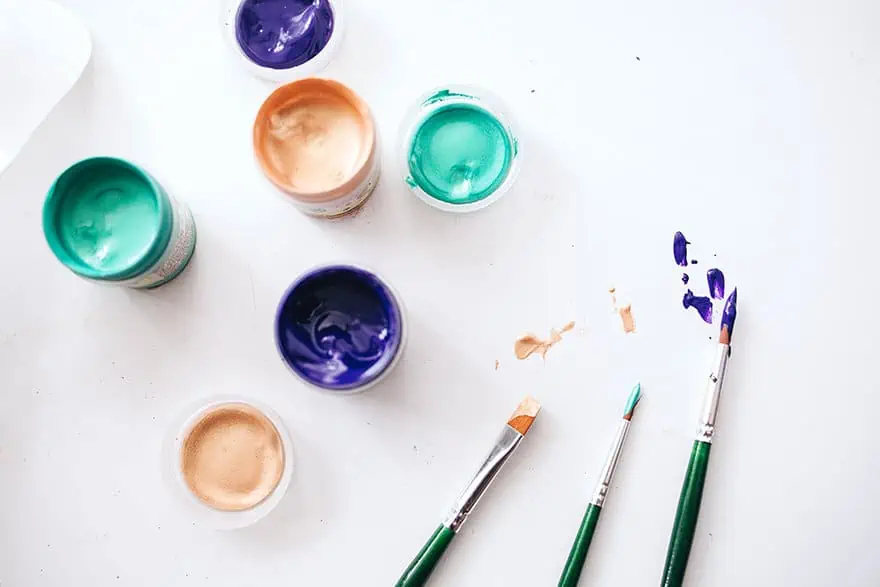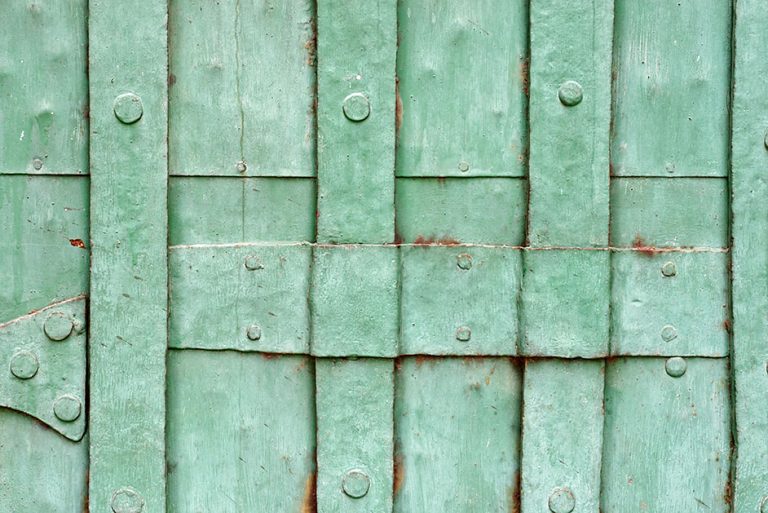Acrylic vs Latex Paint – Difference between Acrylic and Latex Paint
This post may contain affiliate links. We may earn a small commission from purchases made through them, at no additional cost to you.
When presented with the various paint options out there, you may have asked yourself what the difference between acrylic and latex paint is. Why you would choose one over the other, what their benefits might be and why latex paints are often cheaper than acrylics. In this article, we are going to answer those questions.
Table of Contents
What Is Latex Paint?
Before we can determine the benefits of each painting medium, we will need to establish what they are, how they are made, and what they are used for. We will start with latex paint. Many ask Is latex paint water-based? The short answer is yes. Latex paints are water-based while acrylics contain chemicals. This gives latex paint the advantage of being able to wash off very easily from surfaces and your paintbrushes. It also means this paint is of a much thinner consistency, making it dry very quickly. Latex paints also come in different gloss finish options, while acrylic paint usually has a standard matte finish.
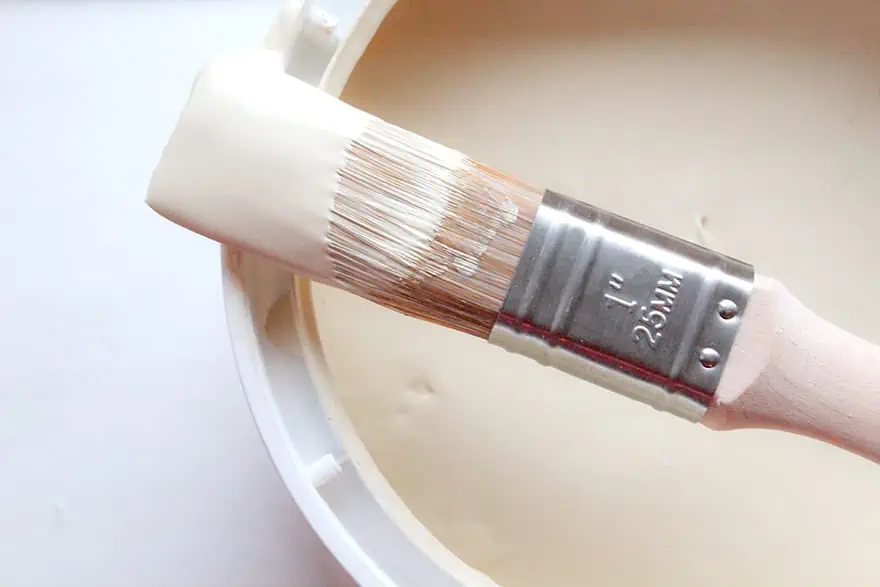
What is Latex Paint Used For?
Both mediums are used for home projects and paint jobs as they come in a wide range of colors and are durable indoor paints. Latex is commonly used for covering larger areas as it is sold in bigger quantities than acrylics usually are. Another advantage of using latex paints is that they generally do not have an odor being water-based. Which makes them safer and non-toxic when exposed to children, pets, or skin.
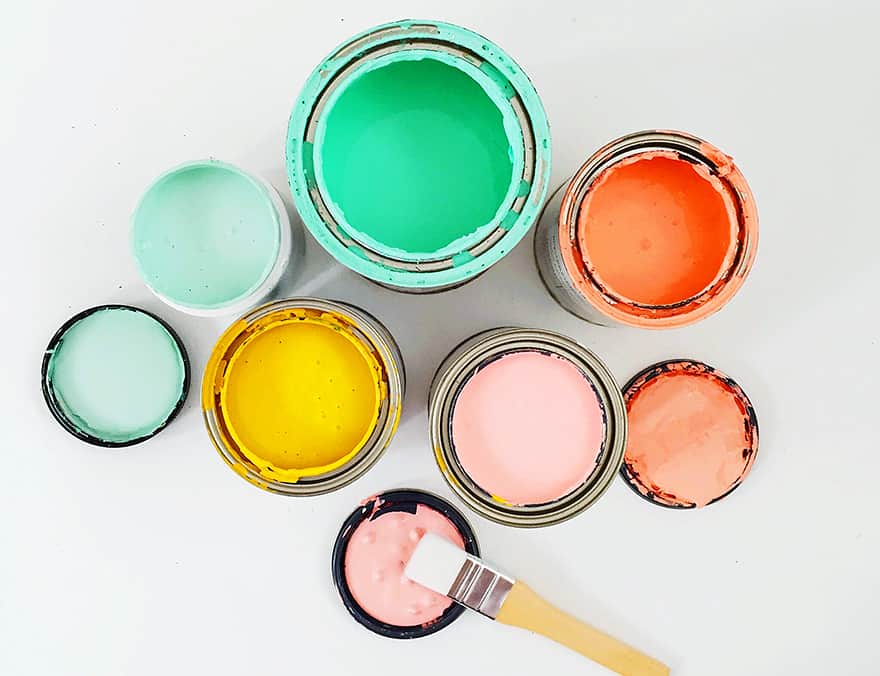
Benefits of Using Latex versus Acrylic Paint
Aside from the low odor and low toxicity, latex paints are wonderful indoor paint options as they tend to maintain their colors over time and resists chalking. This would be a good medium to use when painting areas with high humidity or moisture levels. Latex paints acts as a sealer for the surface and will prevent the growth of mold and other fungi. It must be painted on a dry surface however for best results. This versatile painting medium can be used on many surfaces including wood, brick, metal, and cement. Not to mention the fabulously quick drying time, making it easier to do more with less stress.
PROS
- Water-based
- Safer and non-toxic
- No harsh fumes
- No chemicals required
- Easy clean up for brushes and surfaces with soap and water
- Dries very quickly
- Available in various finish options
- Resistant to mildew and mold
- Resist chalking
CONS
- Not durable for outdoor use
- Not resistant to extreme temperatures
- Must be applied to a dry and primed surface for best results
- Not a breathable paint
What Is Acrylic Paint?
As we mentioned above, acrylic paints are made with chemicals and acrylic resins. These resins are what give them their texture and vibrancy. Acrylic paints are known among crafters and artists alike, for being a quick and easy-to-use medium. Acrylic house paints, however, are much stronger and will require the use of thinners or harsh chemicals to clean up your area and your brushes. These are made to be used on interior and for some, exterior walls. This means they will last much longer than using a tube of your regular artist acrylics on the wall. Acrylics for home projects also come in bigger paint cans so you can cover more whether it’s just a room or the whole house.
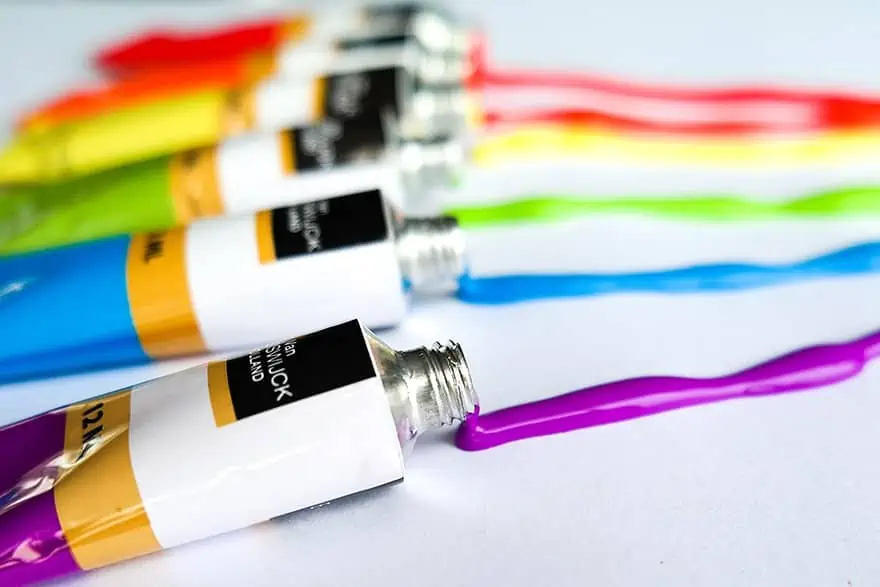
What are Acrylic Paints Used For?
These paints can be used on paper, wood, canvas, plaster, ceramics, and more! Making them an ideal medium for DIY jobs around the home or upcycling furniture. Also being relatively affordable, acrylics are a durable and easy medium to use. An added benefit of acrylic is that they are breathable, meaning that once dry they have a higher resistance to sun or water damage. These paints have an elastic quality which allows them to expand and contract, making them great to use for outdoor work and they will not fade over time.

Benefits of Acrylic vs Latex Paint
Acrylics are more durable and will better adhere to both indoor and outdoor surfaces than your latex paints will. They are easy to apply to porous surfaces making them a wonderful option for wood and other furniture renewal. Acrylics are very easy to use and apply, they flow onto the surface and provide a rich color palette to work with. These paints will also not be affected by weather or climate conditions and changes.
PROS
- Versatile medium can be used on many surfaces
- Readily available
- Indoor and outdoor use
- Wide range of colors
- Paint retains color pigments, will not fade over time
- Not affected by heat or moisture conditions
- Breathable
- Will contract and expand naturally preventing cracks and peeling
CONS
- The use of chemical solvents is required
- Come in smaller quantities than latex paint
- Not as many different finishes available
What Is Acrylic Latex Paint?
Just to add another contender into the ring, there is an acrylic latex paint option that is also available. This is considered to be one of the best quality latex paints on the market, the best of both paints combined. An acrylic resin is added to this latex paint to give it the best possible adhesion and durability qualities. This allows your paint to contract and expand along with temperature fluctuations, and weather changes and still maintain a glossy finish. Other paints do not offer this quality, and this is why they tend to peel and crack on outdoor surfaces.
Because of the acrylic resin in these paints, they offer superior adhesion on surfaces like metal and wood. Making them ideal for furniture or metal painting too. This also provides them with the temperature resistance factor making them the best option for painting exterior surfaces.
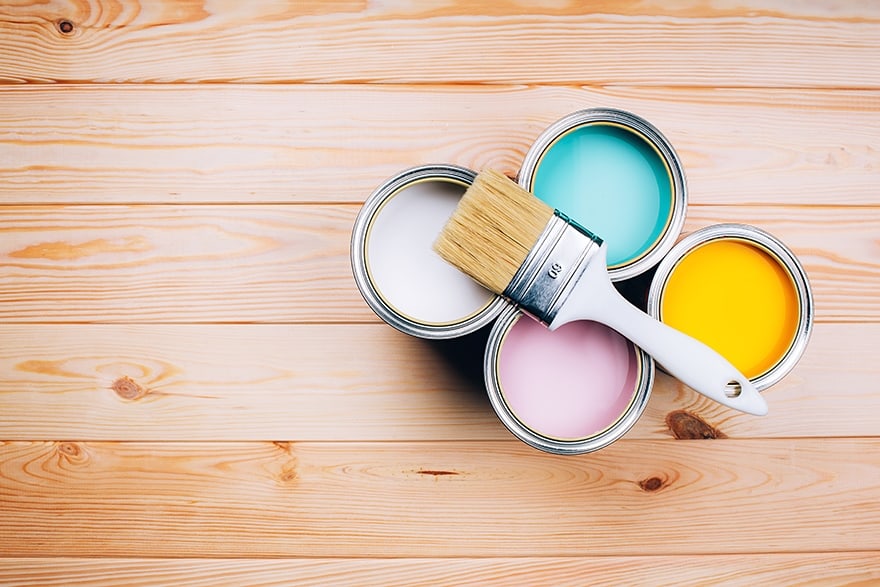
Benefits of Using Acrylic Latex
As we have seen this range of paints is the best of both worlds. They are also environmentally friendly being free of chemical solvents, unlike normal latex paints. This makes acrylic latex paints safer to use and easier to clean up from your brushes and surfaces using soap and water. Acrylic latex paints will also not fade, crack or yellow over time. Their color retention ability is superior to other latex and oil-based paints.
These paints have a fast-drying time and will maintain resistance to mold, chipping, moisture damage, and other problems usually associated with other paint options. Acrylic latex paints are also easy to maintain once are on your surface. Dirty walls and scuff marks can easily be wiped down without damaging or removing the paint. There are some disadvantages of using this medium too. Being such top quality, acrylic latex paints are very expensive. They also should only be used on clean, prepped, and primed surfaces for the best results and adhesion. As this paint is water-based, it may cause rusting when liberally applied to certain metals.
PROS
- Best of both mediums
- Water-based
- Easy cleanup and safe to use
- No chemicals or solvents required
- No yellowing, chipping, or cracking
- Amazing color retention
- Indoor and outdoor use
- Can handle exposure to extreme temperatures and weather conditions
- Can be used on a variety of surfaces
CONS
- Will not work on wet, dirty, or rough surfaces
- May cause rusting to certain metals
- Expensive
Now that we know the different paint options in the way of latex versus acrylic paints, let’s take a look at some tips when using these mediums for your projects.
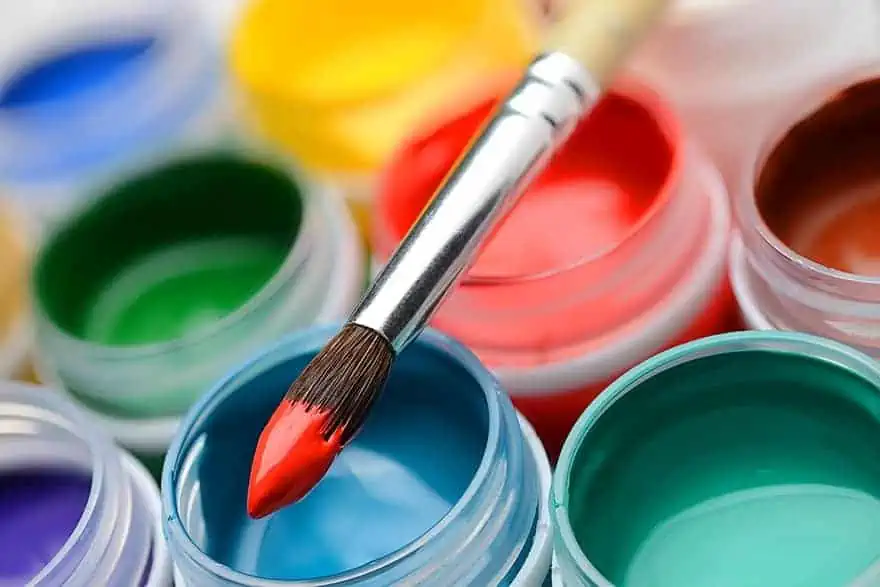
Tips and Tricks When Using Latex and Acrylic Paints
When painting your home or furniture, there are some simple tips to remember to get the best out of your paints and your surfaces.
You will need:
- Drop cloth
- Old rag
- Tape
- Primer
- Brushes and rollers
- Paint
Method:
- Always prep your surface – This can be done by first wiping down your wall with a damp cloth to remove any marks or dirt. Now lay down your drop cloth or an old sheet. Make sure it covers your floor area properly to avoid spills.
- Apply your tape to any areas that should not get paint over them.
- Apply a primer – now that your area is ready, you can apply a primer to the area and let that dry completely. This may take a while depending on the size of your area and how many layers you are using. You can apply up to three coats if you need to.
- Get Painting – Once that is dry you can start to apply your paint to your wall or furniture. If you plan on using more than one coat, be sure to wait for the initial layers to dry before adding more.
- What tools to use – Paintbrushes and rollers can be used for different things. Depending on the sizing, smaller places are easier to get to and coat with a thinner brush. If you are able to go over these with your roller afterward, you will notice how it removes any bubbles or uneven spots.
- Where to start -It is always best to start with the trim or edges before covering the larger area when painting walls. Carefully paint your trims with a small brush to get to the hard-to-reach places ensuring maximum coverage. Then for a smoother effect, quickly go over that paint with a roller before it dries. This will avoid your edges looking different from the rest of the wall once you are done.
- After a day or two, once your surface is dry you can wipe it down and use it without fear of damage or fading.
We hoped you enjoyed reading about acrylic vs latex paints. Now you can confidently start that home project you have been putting off. Happy Painting!
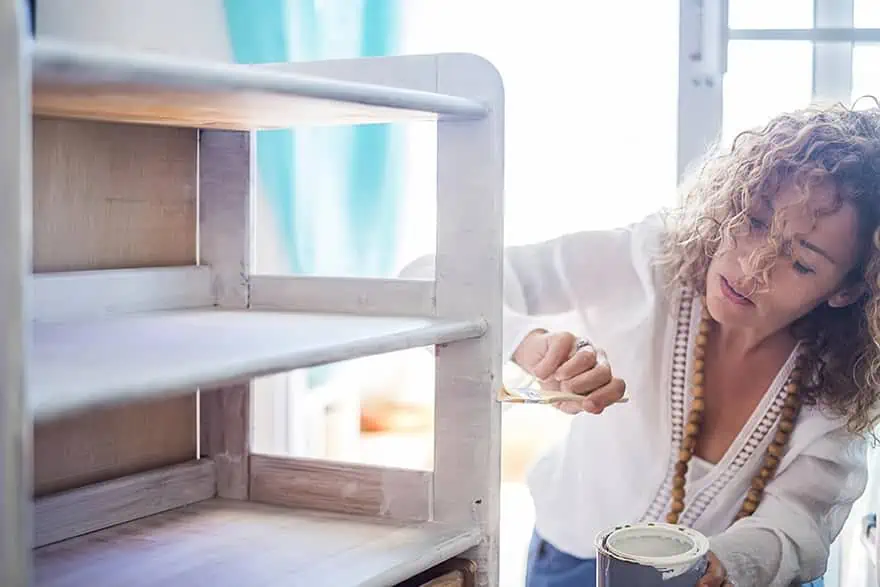
Take a look at our latex vs acrylic paint webstory here!
Frequently Asked Questions
Is Acrylic Paint Water-Based?
Acrylic paint is a chemical-based paint containing acrylic resins. This is often why acrylic mediums are so much thicker than water-based options. These paints cannot be cleaned up with water and will need the aid of chemicals or thinners to remove them. This factor is also what makes acrylic paints so much more durable than oil and latex options.
What is The Difference Between Acrylic and Latex Paint?
Latex paint is water-based and safer to use than acrylic. This also means that it is easily washed off surfaces and therefore not a durable option for outdoor use. Latex paints also do not give off a strong odor as other paints would, and they come in a variety of finishes. Acrylic paints are chemical-based, thus being tougher and more versatile than latex. Although acrylics often come with a natural matte finish or fewer gloss options than latex paints do. Acrylic paints are elastic and breathable, which allows them to be used on different surfaces without being damaged as easily as other paints would.
What is Acrylic Latex?
Acrylic latex paints are water-based with acrylic resin included. This gives them the benefits from both paint mediums combined, forming heavy-duty, long-lasting paint. Unfortunately, this is also what makes them so pricey.
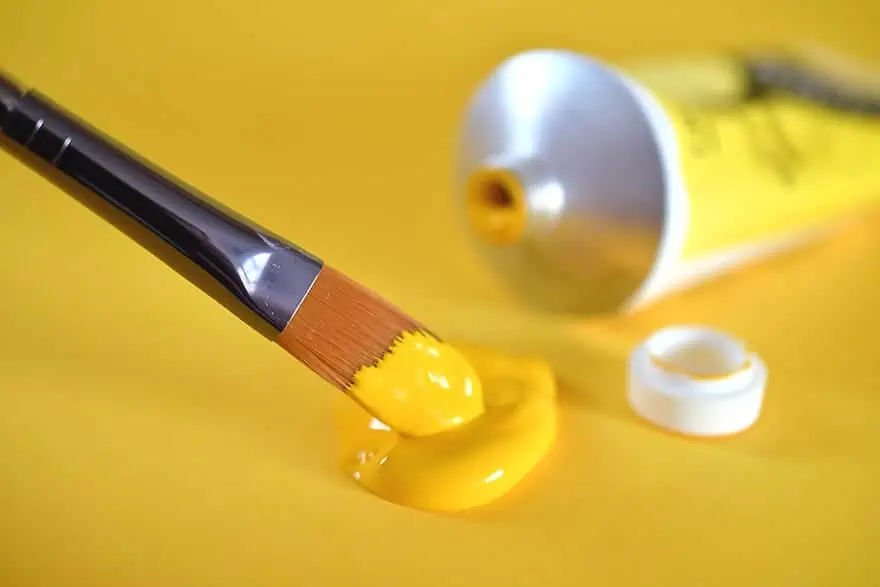
In 2005, Charlene completed her wellness degrees in therapeutic aromatherapy and reflexology at the International School of Reflexology and Meridian Therapy. She worked for a company offering corporate wellness programs for several years before opening her own therapy practice. In 2015, she was asked by a digital marketer friend to join her company as a content creator, and it was here that she discovered her enthusiasm for writing. Since entering the world of content creation, she has gained a lot of experience over the years writing about various topics such as beauty, health, wellness, travel, crafting, and much more. Due to various circumstances, she had to give up her therapy practice and now works as a freelance writer. Since she is a very creative person and as a balance to writing likes to be active in various areas of art and crafts, the activity at acrylgiessen.com is perfect for her to contribute their knowledge and experience in various creative topics.
Learn more about Charlene Lewis and about us.
